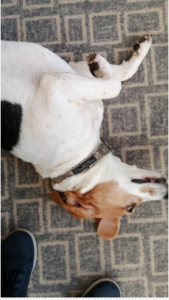Not long ago, an email was circulated to all PhD students in our School introducing Dr. Sheila Rodgers as the School’s Postgraduate Research (PGR) director.
Being a student in the School for some years now, I know that the PGR director deals with matters related to PGR students. But I wasn’t clued up about its roles and responsibilities and what these entail for PhD students.
 Apparently, the Research Bow’s team was in the same boat. We discussed what kind of situations PhD students would approach and seek support from the PGR Director. No one was entirely sure about them. We then decided to interview Sheila to learn about her role and responsibilities as a PGR director and to know more about her work and activities during the lockdown. As she is also a Senior Lecturer in Nursing Studies and an Honorary Research Consultant in Critical Care at NHS Lothian, we thought it would also be interesting to find out about her teaching and research too.
Apparently, the Research Bow’s team was in the same boat. We discussed what kind of situations PhD students would approach and seek support from the PGR Director. No one was entirely sure about them. We then decided to interview Sheila to learn about her role and responsibilities as a PGR director and to know more about her work and activities during the lockdown. As she is also a Senior Lecturer in Nursing Studies and an Honorary Research Consultant in Critical Care at NHS Lothian, we thought it would also be interesting to find out about her teaching and research too.
In this interview, Sheila talks about her experience in the lockdown and discusses her varied work as a lecturer, a researcher and a PGR Director. Here are the key takeaways:
- Sheila has been busy lately mostly with work — teaching preparation and organisation, settling in as a new PGR director and running new research projects.
If you can get a balance of a variety of work, that’s good for you.
- She took up the role of PGR Director in mid-March, just a week before the lockdown!
- In this lockdown, what she misses the most when working from home is the community of colleagues and students. She also misses seeing her extended family who is mostly in England and riding her bike.
It’s more the people you miss, not the place.
- She loves her animals — walking the dog, horse riding and stroking the cat.
- Sheila’s main roles as a PGR Director include two broad areas: (1) recruitment and admissions and (2) student experience. Her typical day usually involves a lot of emails, meetings with the PGR directors from each subject and attending responsibilities related to the College Exams Committee.
- Sheila’s activities around her lecturer roles include supervising PhD students, preparing and delivering undergraduate and postgraduate teaching,
- She is also the University lead for the ESRC Scottish Graduate School in Social Science on the Health and Families pathway.
- As an honorary research consultant for NHS Lothian, Sheila is currently involved in three research projects about diaries for family members of the intensive care patients and remote respiratory monitoring of Covid-19 patients.
- Sheila thinks that a variety of work is good, as long as it’s balanced.
- She points out the Doctoral College as the central resources for PhD students across colleges.
Often the most exciting plans come from the students themselves and I am keen to support students to develop these
- PhD students can seek support and approach Sheila if they (and their supervisors) want to discuss issues that they’re not sure about. Alison, Louise and Naseem are also an important point of contacts for PGR support.
- Sheila’s message on how to make the most out of PhD experience:
Grab every available opportunity – it will set you up for the rest of your career!
The full interview is below (some answers were edited for readability)

What have you been up to lately?
Well – mostly work I am afraid, just trying to get everything organised from the University’s point of view, planning, trying to plan for going forward, and managing things we would normally have done. It’s been pretty crazy, rapidly changing situation and I was just new to School PGR role too. I’m in Nursing Studies as well. We’ve had a lot of issues, particularly undergraduate students’ placements and the clinical liaison stuff. Then, dealing with all the stuff with postgraduate students: Can they go? Can they not? What happens to visas? Do they need a leave of absence? So, there’s a lot to get organised and that takes an awful lot of time, although at least the pace of change seems to be slowing a little bit. You know, in the beginning, you would think, “right, let’s do this” and then the next day something different happened. There’s a lack of uncertainty that creates a lot of demand.
Since when you’ve become a PGR director?
About the same as lockdown, around a week before that. So, from mid-March time. So yeah, Gus is covering for somebody on leave in Clinical Psychology. So, I’m covering the PGR director and we’re all shuffling around a bit.
How do you find working from home? Do you enjoy it or do you prefer working from your office?
I work from home occasionally anyway. So, for the desk stuff that we do that’s absolutely fine. When I reflected on this, I thought since I’ve moved offices, I have lots of colleagues from Nursing and the PhD students just next door which has been fantastic. There’s a lot of community there, and I really miss that. It’s more the people you miss, not the place. Because the work is the same. The desk is the desk wherever you put it. But I’ll guess it’s not the same for everybody. You’re missing your immediate colleagues you’re having around, you know, being part of that community.
What did you miss the most during the lockdown?
I missed seeing my extended family. I think that’s hard for everybody. Most of my family live in England. It’s not a 5-mile journey to get there. The other thing is riding my bike. How funny is that? (laughing). I sometimes walk to work, but most of my day I cycle.
What Do You Do in Your Spare Time?
I love my animals — so walking the dog, horse riding and simply stroking the cat. I’ve walked my dog down the Meadows. So, I’m not too disconnected from the University in that way.
What does a typical workday for you as a senior lecturer and a PGR director look like?
 No two days are the same but there are always lots and lots of emails! That’s the worst of working at home and having offices across split sites. We don’t do enough speaking to people to resolve or plan which creates a much stronger team approach. I have quite a number of PhD students so supervising them is a big part of my working day. Preparing and delivering teaching from CPR to first year undergraduates to teaching research methods to postgrads. As PGR Director, I link into a number of groups and meetings such as the Doctoral College and the College exams committee. I am also the University lead for the ESRC Scottish Graduate School in Social Science on the Health and Families pathway. We manage the provision of scholarships and research training and support. Then I have my research work from writing up publications to writing new proposals and running currently funded projects.
No two days are the same but there are always lots and lots of emails! That’s the worst of working at home and having offices across split sites. We don’t do enough speaking to people to resolve or plan which creates a much stronger team approach. I have quite a number of PhD students so supervising them is a big part of my working day. Preparing and delivering teaching from CPR to first year undergraduates to teaching research methods to postgrads. As PGR Director, I link into a number of groups and meetings such as the Doctoral College and the College exams committee. I am also the University lead for the ESRC Scottish Graduate School in Social Science on the Health and Families pathway. We manage the provision of scholarships and research training and support. Then I have my research work from writing up publications to writing new proposals and running currently funded projects.
At the moment, I am involved with three funded projects, two looking at diaries for family members of patients who are in intensive care and another looking at the use of remote respiratory monitoring for Covid-19 patients. I have a long standing honorary clinical role with NHS Lothian and the main purpose of this is to support Research and Development. I am based in Critical Care and at the moment am supporting the use of the family diaries and also the implementation of video communication between families and critical care staff. Only one key family member is allowed to visit whereas during the height of the pandemic there were no visitors allowed at all. Staff are creating video messages from themselves and their patients to send to families and recently we added a function so families can send photos and videos back in too. We are conducting research around this which will be with others in Scotland who are also implementing this system.
It does sound like a very long day!
It’s a good variety, though. One thing feeds into another and I think it’s a good balance. If you can get a balance of a variety of work, that’s good for you.
Could you share with us your roles and responsibilities as a PGR director?
There are two broad categories here, student recruitment and admissions and student experience on programme. In terms of student experience it can be anything from the way we do supervision, the way we do annual reviews, making sure that we getting students all the opportunities, and access to other wider opportunities that they need to develop and have the right resources around them to do that. There’s also an element of supporting staff and students when things maybe go wrong or there’s a situation that is more challenging and needs to be resolved. There’s certainly been quite a few of challenges in my first few months of doing this. It feels probably a little bit disproportionate at the moment and I think things will settle down. Louise and Alison are critical to both these aspects and we work really closely together with Nasseem who is the new lead academic officer for the School. Alison is the programme administrator for students on programme and Louise deals with all the admissions and student support for those on programme. We work as a team with the PGR Directors in each subject area to look at how we manage all these aspects. Some of the other things that I do are more admin tasks, so for example yesterday, I spent about two hours on College Exams Committee. So, going through all the returns from the examiners from PhD vivas and by an examination of the thesis to and to look at the decisions have been made, to input that. I’m part of the committee that does that.
What would be a typical situation when a PGR student approaches you?
Usually, because they’ve got a problem. They want to talk to somebody who’s a bit more removed or perhaps in the position that will be able to talk to somebody on their behalf. That’s often the case. Sometimes it comes through the supervisors as well. The supervisor and the student say: “look we’re not quite sure what we should be doing about that and you can help”. I don’t have all the answers. Sometimes it’s Alison and Louise are the better place to answer some of these queries, especially if it’s around admissions processes. It’s always good to talk things through with other people and find out their views, to try to find a path forward for people. There is usually a way forward that can accommodate most of the issues.
As your capacity as a PGR director, do you have any exciting plans or goals for the PGR students in our School?
Often the most exciting plans come from the students themselves and I am keen to support students to develop these. I think the Doctoral College will have quite an impact on the way we work and open up a whole new community to PGR students across the University. So rather than having three colleges just doing a lot of that separately, the Doctoral College will bring everything together and so we’re consistent across colleges and share information a bit more. All the central resources and information is on the SharePoint site. There should be real opportunities for wider interdisciplinary collaboration. Oh, one more thing, I like a strategy document – preferably in a table but I guess most people will not find that very exciting.
Can you share some tips on how to make the most of the research experience for our PGR students?
Remember, this is a unique opportunity in your life to follow your passion and focus solely on your own research work, whether you are full or part-time. Savour every minute of it even when you are writing up and can’t wait to see the back of the thesis! Make connections – even ones that are not directly linked to what you are doing, get your work out there – publish, go to conferences and meetings. Really just grab every available opportunity – it will set you up for the rest of your career!
Learn more about the University of Edinburgh Doctoral College here: https://uoe.sharepoint.com/sites/DoctoralCollege
Useful contact points:
PGR Director for the School of Health in Social Science
Sheila Rodgers (s.rodgers@ed.ac.uk/)
PGR Director for Clinical Psychology
Helen Sharpe (helen.sharpe@ed.ac.uk)
PGR Director for Counselling and Psychotherapy
Jonathan Wyatt (jonathan.wyatt@ed.ac.uk)
PGR Director for Health
Marisa DeAndrade (marisa.deandrade@ed.ac.uk
PGR Director for Nursing Studies
Siobhán O’Connor (siobhan.oconnor@ed.ac.uk)
Postgraduate Research Administrator
Alison Grahamslaw (Alison.Grahamslaw@ed.ac.uk)
Postgraduate Research Admissions/Student Support Officer
Louise Carracher (l.carracher@ed.ac.uk)
Student and Academic Services Manager
Nasseem Fazel-Hamedani (Nasseem.fazel@ed.ac.uk)




